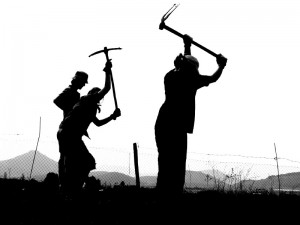A number of years ago, someone wrote an article in a Jewish publication about how wonderful it is that we now have the computer capability to quickly search and find what we're looking for, while learning Torah.
The way he put it was, "no more wasting precious time trying to locate the Rambam, Shulchan Aruch etc", and "no more time wasted finding a sefer or trying to figure out the translation of difficult words."
There was a response in the next issue which took exception to the whole article, bringing up the issue of having computers altogether, as well as the issue of ameilus ba'Torah (exertion in Torah study), that clicking a couple of times to find a source eliminates ameilus ba'Torah.
The author's response was 1) that which is invented can be used for good or bad 2) it got approval from gedolim etc. and 3) "ameilus" does not really refer to hours spent looking around for the right sefer or trying to figure out a translation. He called that bittul zman (wasting time).
My question is: what is true ameilus or yegiah (exertion)?
Over the years, I've collected examples of people exerting themselves for a mitzva when their actions are ostensibly unnecessary:
The story of the Rebbe walking to get mayim sh'lanu (water for matza baking) when overtaken by another Rebbe in a wagon who asked him to join him on the wagon. The one walking said he didn't want to share the mitzva with a horse.
What is the justification for saying this? Would he really be sharing his mitzva with the horse if he rode rather than walked? And maybe if he conserved energy by riding, he could learn more Torah later on?
Or in "Guardian of Jerusalem", p. 134 , R' Yosef Chaim Sonnenfeld says he doesn't want to get into the carriage because, "We are involved in saving a Jew's life. I prefer to perform this mitzva on my own, without the help of a carriage."
Or R' Y.Y. Herman ("All for the Boss"), who got out of the wagon to walk in the mud to the Chofetz Chaim.
Or Chasidim walking to their Rebbe instead of riding, or walking to the Kosel (in a story written by Meir Wikler) which took all day for Reb Elya. Was that a waste of time? Maybe he should have taken a taxi and spent the rest of the day learning?
Or the Terumas Ha'Deshen (who precedes the Beis Yosef and is constantly quoted) who objected to the "lazy susan" (a revolving platform) in the beis medrash to make it easier to get sefarim. He certainly wouldn't approve a Torah CD Rom!
Then there is the Gemara in Menachos about the rav who went to talmid to learn something he (the rav) forgot. Why did he go to the talmid rather than the talmid going to his teacher? Because the yegia would help him.
more examples to follow




No comments:
Post a Comment